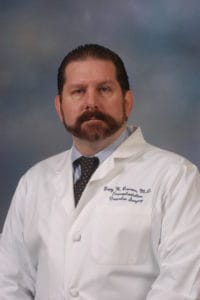In 2018, Fort Smith Man Received UAMS’ 2018th transplant.
| On Nov. 29, 2018, John Drossopolus’ rode his mountain bike for the first time in more than five months. While his strength was not 100 percent, the Fort Smith man feels he is almost there.
Drossopolus’ personal mantra is three-pronged and it starts with having a positive attitude. He was living with chronic kidney disease and used to spend four hours a day, three days a week getting dialysis. While the sessions limited his freedom somewhat, Drossopolus wanted to make sure he stayed active.
“After dialysis, I’d go to the gym,” he said. “I’d lift weights. I’m talking heavy weights. I’d ride my mountain bike. But as time wore on, I could feel myself deteriorating. I prayed for something to change.”
Spirituality is another prong of Drossopolus’ mantra. It wasn’t long after his prayer that he got a call with good news from UAMS.
“They told me they had a kidney for me.”
“Mr. Drossopolus was an excellent candidate for a transplant,” said Aparna Sharma, M.D., a transplant nephrologist who works in the kidney transplant clinic at UAMS. “The procedure went very well. We have highly skilled surgeons on our team. Mr. Drossopolus is an example of how a kidney transplant can drastically improve a person’s quality of life.”
Drossopolus’ surgery was also a milestone for the UAMS Transplant Program. His surgery marked the 2018th transplant since Arkansas’ first kidney transplant in 1964. Transplant surgeon Gary Barone, M.D., now in his 27th year at UAMS has been a key member of the transplant team along with the late Sameh Abul-Ezz, M.D., Dr.P.H., who died in 2016. Together, these two physicians helped grow the program to what it is today.
“Dr. Barone has performed a majority of the transplants here as well as donor operations. He’s achieved first-rate outcomes, helping to establish a quality program in Arkansas,” said Lyle Burdine, M.D., Ph.D., director of the Solid Organ Transplant program at UAMS. “Dr. Barone is one of the most competent kidney transplant surgeons in the southern United States. UAMS is lucky to have someone with his work ethic and caliber on our staff.”
In 2016, UAMS became the only kidney program in the state. There is a high incidence of kidney disease in Arkansas. UAMS doctors hope more people will consider becoming living donors.
“Every individual who intends to be a living kidney donor undergoes a full medical evaluation,” Sharma said. “That includes a detailed history, a physical exam, lab test and imaging. We make sure the potential donor is an optimal candidate before moving forward.”
Researchers have studied the long-term health of living donors and have found that many of them actually have a longer life expectancy than the general population. Doctors say that’s because a donor has to be healthy enough to donate in the first place and they’re kept under medical surveillance for the rest of their lives.
Drossopolus is a go-getter and has challenged himself to gain back his strength. The third prong of his mantra is hard work. Now that he’s a few months removed from his surgery, he says he feels great and hardly sits still.
“I get up every morning and do work around the house. I do my recommended therapy. I’ve been on my road bike. I do about 25-30 miles,” he said. “Yesterday I decided I’d try the mountain bike again. That’s a little more challenging. I did eight miles and I feel great! I believe in another few months I’ll be fully restored to 100 percent.”
Drossopolus’ dialysis treatments kept him from traveling. With the new kidney, he hopes to go back to visit his family in Greece, his native country.

